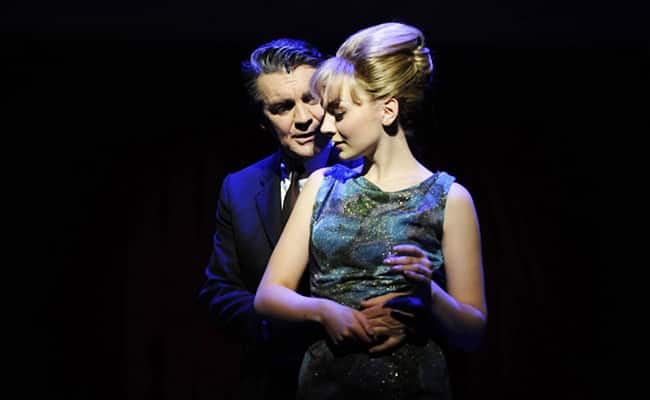
Stephen Ward
Aldwych Theatre
December 20 2013
1 Star
I am happy to admit to being a fan of the early work of Andrew Lloyd Webber (Joseph; Superstar; Evita; Cats; Song and Dance; Starlight Express; Phantom) and even quite a lot of the later work (Beautiful Game; Whistle Down The Wind; Aspects of Love; Sunset Boulevard). He is a composer capable of quite remarkable melody and ingenious tunes.
Now playing at the Aldwych Theatre is his latest work, Stephen Ward, directed by Sir Richard Eyre. The book and lyrics are provided by Christopher Hampton and Don Black and each should be publicly flogged: this is the worst book and the worst lyrics of any show I have ever seen.
The piece has no idea what it is doing: it does not tell any story well or with feeling. You know as much about Stephen Ward and his part in the Profumo scandal when the final curtain falls as you do when the opening notes sound in the orchestra.
You don’t know what motivated any of the major players in the scandal, what the key points were, why the government fell, why the establishment turned on Ward, what happened to Keeler and Rice Davies or what brought about the downfall of Profumo himself. There is a lot of sketchy toing and froing, but no clear line, no narrative thrust. And no sense of a complete conceit or concept at work.
Rob Howell’s lamentable set and costumes help nothing; the design actively works against any sense of the time or the drama. There are curtains and projections and one dimensional flats and the odd sofa or chair or table. It is as lacklustre as it gets; the Rooty Hill RSL would be ashamed of this set.
There are five really good tunes: Super-Duper Hula-Hooper; This Side of the Sky; You’ve Never Had It So Good; I’m Hopeless When It Comes To You and Too Close To The Flame – but that is it. The rest of the score is risible in almost every way. And terminally dull. And pretentiously self-important and derivative.
It is, however, difficult to tell whether that is mostly because of the orchestrations, which are quite dire, and which are courtesy of Sir Andrew himself. Usually he leaves the orchestrations to others, a wise move frankly. And while the orchestra here cannot be faulted, and Graham Hurman conducted with verve and a clear and resonant connection with the music, the simple fact is that the orchestrations rob most of the music of its greatest potential, and some of the music does not have that much to start with.
Hurman can see what the music could be and reacts to that; watching him in the pit suggests music more funky, more alive, more thrilling than that which washes over you from the stage. One would rather hear what Hurman is feeling than what one is actually listening to. The irresistible feeling is that this is a good score, sans lyrics, for a TV series or film, but it cannot sustain a piece of theatrical endeavour.
The cast oversing and shout way way too often, which is curiously unfathomable, because they all can clearly sing – and very well. Sometimes they are so loud the lyrics are drowned, which might be a blessing but it is best for the audience to make up its own mind about that.
Eyre’s direction makes it move along at a glacial pace: the first Act seems like three hours when it is only one. But then it is difficult to believe that any director could make this narrative, these lyrics, sparkle and shine.
Stephen Mears’ choreography is as delightful and clever as one expects and this is especially true in the orgy sequence in You’ve Never Had It So Good, but also everywhere his hand is in evidence.
Of the cast, the stand-outs are Joanna Riding’s clipped Valerie and Daniel Flynn’s pompous trouser-snake led Profumo. Riding’s Act Two solo is as close as this score gets to Lloyd-Webber magic but, alas, it is not really close enough.
Alexander Hansen is suave but ultimately tepid as Ward, partly because of the writing but partly because he does not energise the character sufficiently. One never knows why he does what he does. It is hard not to feel sorry for him though because it is clear he is struggling manfully to carry the impossible burden the creative have saddled him with.
Charlotte Spencer has a touch of the young Diana Rigg about her looks but her similarity with the Dame ends there; her Christine Keeler is as blank a canvas as Patrick Bateman in American Pyscho. Zero warmth and less empathy. She sings well in the beginning of the piece, but it quickly falls away. Charlotte Blackledge is loud and out of tune as Mandy Rice-Davies, a character who arrives without introduction and whose part in proceedings is never fully explained. It is rather like a production of Gypsy where you are never told Tulsa wants to dance: you just have no idea why she is part of the piece.
There is good support work from Anthony Calf, Martin Callaghan, Kate Coysten, Wayne Robinson and Emma Kate Nelson. Most of the rest of the cast need to scale back their performances, find some reality in the moustache-swirling sections or the hip-thrusting segments.
Musicals do not become interesting just because someone says “Fuck”, someone else has simulated sex and someone else is naked. There needs to be a through line of narrative, however flimsy, a purpose, a point and, most importantly, a heart.
Stephen Ward has no heart and less of a concept or conceit to sustain it. As a first workshop, this would be marked adventurous but misguided, with lots of work to do on book, lyrics, orchestration and score (in that order). On the West End, at £67.50 a ticket, it is a travesty. Viva Forever! was better than this – in every way.
